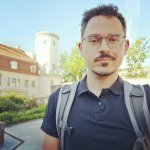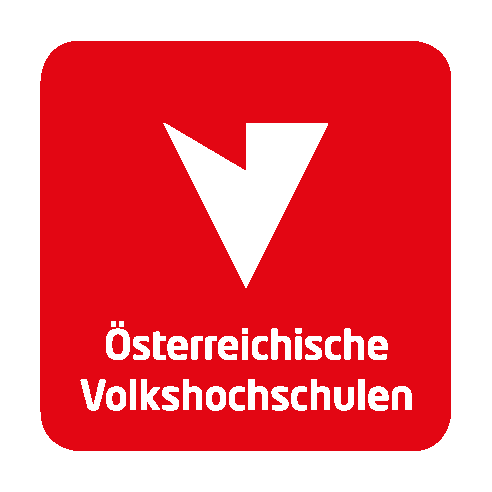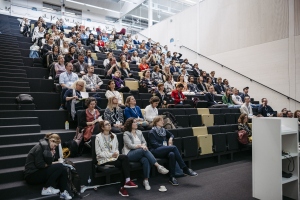
Daniel Dörler
New: SoilRise
SoilRise is a new research project on earthworm biodiversity in Europe. Earthworms play a crucial role in soil fertility and are considered important ecosystem engineers. With the help of citizen scientists the project team would like to collect data on the distribution and diversity of earthworms in Europe. If you want to know more, check out the project description on Österreich forscht and join the project.
New: TRA:WELL
The new TRA:WELL project focuses on the relationship between active mobility (walking, cycling, scooters) and the well-being of young people. The entire physical activity behaviour is considered in order to assess the contribution of active forms of mobility to the fulfilment of physical activity recommendations. If you want to know more, have a look at the project description on Österreich forscht and join this new project.
New: DANUBE4all
DANUBE4all is a new citizen science project funded by the EU, with the main task of developing a comprehensive action plan for the renaturation of river stretches in the Danube River Basin (DRB). Have a look and join the project!
Proceedings of the ECSA/ACSC 2024 conference published
The proceedings of this year's ECSA/ACSC 2024 double conference have just been published! In the Österreich forscht blog you will find all contributions briefly summarized and individually linked. Have a look right away!
Association of Austrian Adult Education Centr
The Association of Austrian Adult Education Centres (Verband Österreichischer Volkshochschulen – VÖV), founded in 1950, is a non-partisan educational organisation with a long tradition based on a federal structure. It can look back on a specific tradition of adult and general education in Austria that dates back to well into the 19th century. Today, the adult education centres are the largest adult education institution in the country with 700,000 participants per year. All of the programmes on offer claim to be science-based.
The adult education centres
- work on a non-profit and low-threshold basis. They thus offer all people in Austria the opportunity to participate in education.
- are a leading educational institution, for example in the areas of health education, languages, creativity, democratic education and science education, digital skills, basic education and school-leaving qualifications.
- provide a wide range of services for the region and society at over 800 locations, with 1,200 full-time employees, 13,000 course instructors and numerous volunteers, and are important local and regional meeting places.
- are able to react quickly to current requirements in times of crisis.
- offer excellent framework and working conditions for the concrete implementation of education in accordance with recognised quality criteria for all those involved.
- have been active in democracy and science education for over a hundred years and work for social cohesion and sustainable development.
Adult education centres advocate recognising the democratic potential of citizen science at the level of education policy and supporting it accordingly. Citizen science can also be seen as an effective instrument for strengthening trust in science (and thus democracy) through the broadest and most intensive participation possible
At the regional or institutional level, adult education centres are available for corresponding projects and collaborations or are already actively involved in them.
Furthermore, it is not least a matter of at least anchoring approaches and methods of citizen science in various adult education centre course segments or formats.

New: What is citizen science
We have updated one of our most important sections on Österreich forscht. Under What is Citizen Science, we have summarised the most important information for anyone who wants to find out more about citizen science in general. In addition to updated project examples, there is now also an expanded text on the history of citizen science. Take a look now!
New: Citizen science worldwide
We have revised our Worldwide section on Österreich forscht and added exciting new information! Now there's even more to discover. Dive in and take a look!
New project: On the trail of springs
On the trail of springs is the latest project on Österreich forscht. On the project preview page on Österreich forscht you can find out more about the springs being searched for in the project. Take a look and join the project!
New: Dates
The open calls have become the dates! On the new page you will find submission opportunities, jobs and funding opportunities as well as project activities where you can get to know projects directly. Take a look and join one of the activities!
Conference
The Austrian Citizen Science Conference is the main event of the year for the citizen science community in Austria and beyond.
Since 2015 the conference has been organized on an annual basis, each year by a different host institution in close collaboration with Österreich forscht. By collaborating with local host institutions, the conference has been taking place in many different regions of Austria, which makes it possible to connect with the local community. Since 2017 the conference has been divided in two parts. The first two days consist of a scientific programm with oral presentations, workshops and posters and the third day is a public day, where citizen scientists and the general public are invited to the conference to discover new projects and to get to know project coordinators.
You can find detailed information, and pictures of each conference in the links below in German. Conference proceedings containing extended abstracts from selected contributions are available in English since 2016.



